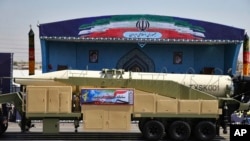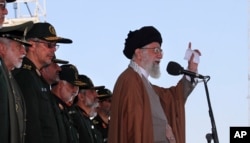The deputy head of Iran's Revolutionary Guards warned Europe that if it threatened Tehran, the Guards would increase the range of missiles to above 2,000 kilometers, the Fars news agency reported Saturday.
France has called for an "uncompromising" dialogue with Iran about its ballistic missile program and a possible negotiation over the issue separate from Tehran's 2015 nuclear deal with world powers.
Iran has repeatedly said its missile program is defensive and not negotiable.
"If we have kept the range of our missiles to 2,000 kilometers, it's not due to lack of technology. ... We are following a strategic doctrine," Brigadier General Hossein Salami said, according to Fars.
"So far we have felt that Europe is not a threat, so we did not increase the range of our missiles. But if Europe wants to turn into a threat, we will increase the range of our missiles," he added.
The United States accused Iran this month of supplying Yemen's Houthi rebels with a missile that was fired into Saudi Arabia in July and called for the United Nations to hold Tehran accountable for violating two U.N. Security Council resolutions.
Iran has denied supplying Houthis with missiles and weapons.
Range seen sufficient — for now
The head of Iran's Revolutionary Guards, Major General Mohammad Ali Jafari, said last month that Iran's 2,000-kilometer missile range could cover "most of American interests and forces" within the region, and Iran does not need to extend it.
Jafari said the ballistic missile range was based on the limits set by the country's Supreme Leader Ayatollah Ali Khamenei, who is the head of armed forces.
Iran has one of the Middle East's largest missile programs, and some of its precision-guided missiles have the range to strike Israel.
The United States says Iran's missile program is a breach of international law because the missiles could carry nuclear warheads in the future.
Iran denies it is seeking nuclear weapons and says its nuclear program is for civilian uses only.
The United States has imposed unilateral sanctions on Iran, saying its missile tests violate a U.N. resolution that calls on Tehran not to undertake activities related to missiles capable of delivering nuclear weapons.






